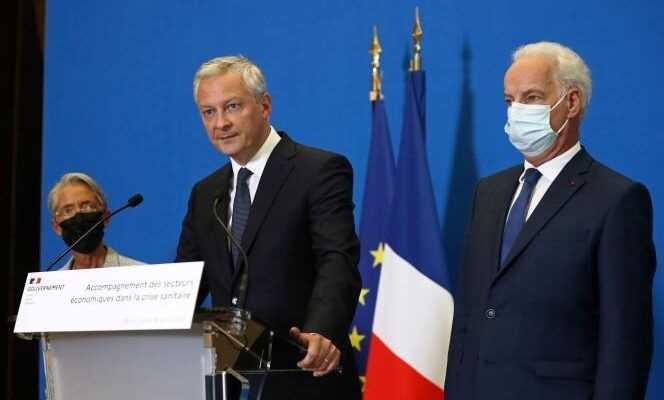It was March 12, 2020. Very solemn, the President of the Republic, Emmanuel Macron, made a commitment, during his first televised address of the Covid era: the executive, “Whatever the cost”, would do everything “To protect our employees and to protect our companies”. Monday August 30, eighteen months later, the Minister of the Economy, Bruno Le Maire, officially turned off the tap that poured 240 billion euros to save an economy artificially shut down due to the health crisis , but which would now be almost cured, according to Bercy.
“From the moment the French economy is running at 99% of its capacity, we must get out of“ whatever the cost ” », Explained the Minister after a meeting with the representatives of several professional sectors still in difficulty. The generous mantra that punctuated the 2020 recession and three lockdowns will now be combined with the past. The solidarity fund will be closed on September 30, in favor of a new strategy, more targeted on the sectors most affected by the crisis, such as business tourism or events. The aid will be calculated “tailor-made” according to the real state of the applicant companies.
For the rest, Bruno Le Maire wants to be confident. No reason to believe that the growth target for the year, set at 6%, will not be reached, thanks to consumption “Well oriented” – and which would not have suffered in any way, according to Bercy, from the implementation of the health pass -, and an economy which should return to its original level ” before the end of the year “. An optimism widely shared by economists. “The activity is robust, the confidence is there”, argues Mathieu Plane, of the OFCE. “The level of activity in the second quarter was down 3.3% compared to the pre-Covid: this is a figure that is not huge, we are getting closer to normalization. Especially since the level of business investment has returned to its pre-crisis level. ”
“Facing the social debt”
For the economist, more than the dynamics of growth, “The central point will therefore be to take stock of the financial crisis on businesses”. Admittedly, the so announced “bankruptcy wall” did not materialize, precisely thanks to the policy of “whatever the cost”. But, according to Thierry Millon, director of studies at Altares, 60,000 companies “In serious tension” could be faced with failures, with the cessation of aid. The state guaranteed loans (PGE) distributed during the crisis – more than 160 billion euros – will have to be repaid, along with the social and fiscal debt.
You have 55.97% of this article to read. The rest is for subscribers only.
